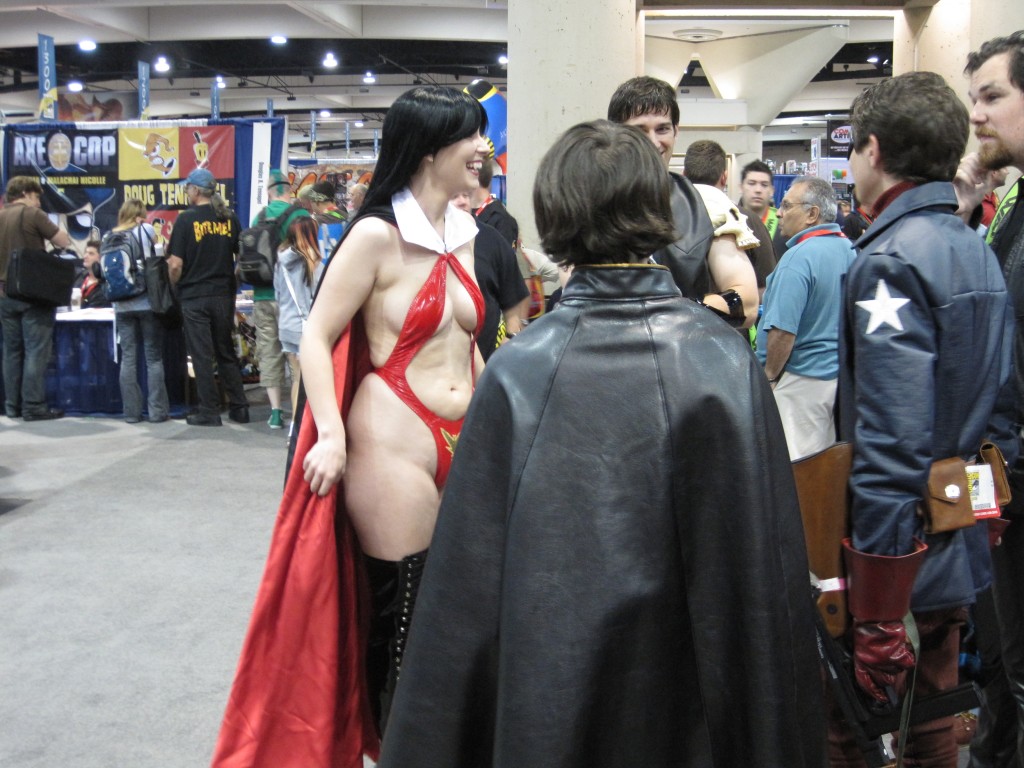 As a male I run the risk of being told I have no right to comment on an issue related to women and their experiences, but given some reflections over the last couple of days I’ll take that risk in order to offer my thoughts and an observation.
As a male I run the risk of being told I have no right to comment on an issue related to women and their experiences, but given some reflections over the last couple of days I’ll take that risk in order to offer my thoughts and an observation.
For some time now the geek community has been engaged in some self-reflection on the issue of the objectification of women in connection with cosplay at conventions. This has ranged from the popular at places like Not the Singularity to the more thoughtful such as that at GeekFeminism.org. There seems to be some disagreement as to whether the clear display of sexuality in cosplay by women is to be understood as a form of empowerment or self-objectification.
This debate was on display in this week’s episode of Fangasm, the new reality series on Syfy. The setup for the program is a group of geek interns who work for Regina Carpinelli, CEO and Co-Founder of Stan Lee’s Comikaze Expo. The series follows their work as interns, and also includes the social context for romance and conflict. This week’s episode, “A Date with a Supermodel,” featured an argument between Mike Reed, a male cosplayer, and Molly McIsaac, a female cosplayer and feminist, over the subject of cosplay and the objectification of women. Hints of what was to come were present in the series premiere where the interns watched a group of female dancers dressed as fantasy characters, to which McIsaac strongly objected, arguing that this was not what cosplay or geek culture was about. The Fangasm website provides a summary of this episode, with this excerpt describing the argument:
He’s not likely to try after their next conversation, in which Molly gets teary-voiced about misogyny in cosplay and tells Mike the male experience isn’t comparable, and he in turn gets annoyed that he’s not allowed to participate in the discussion, and when he wonders why women who don’t want to be sexualized wear revealing costumes, Molly fumes, “Oh my god, slut-shaming,” and leaves the table. Neither of them is doing a good job articulating the difference between “sexualizing” and “harassing,” and Mike’s attempt to apologize is met with Molly misquoting his position. Still, they make up.
Later in the episode Adrianne Curry appeared as a guest on the interns’ podcast. McIsaac used the opportunity to raise the issue of cosplay and the objectification of women. Expecting that Curry would side with her, to her great surprise and Reed’s elation, Curry seemingly saw the issue as a minor one. Readers may be aware that Curry is a celebrity figure in cosplay at conventions, and uses her sexuality as a part of this process. In watching this episode Curry seemed to be holding to a mediating position in the debate between Reed and McIsaac. While women may dress provocatively in their cosplay having the freedom to display their sexuality, nevertheless this does provide an invitation to men to objectify or sexually harass them at conventions. This interpretation of Curry’s views would seem to be supported by her sexualized cosplay, and her past Facebook complaint posted when a man at a convention ran up and took a photo of her crotch when she was vulnerable and did not give consent.
But this interpretation is apparently wrong. Earlier today Carpinelli tweeted a photo of her hand “copping a feel” on Curry’s breast with the text “Cosplay constant THIS!” Curry posted this photo on her Facebook page, and I took the opportunity to offer a comment on my thinking that on Fangasm she offered a mediating position on the cosplay and objectification issue. Later, Curry responded by writing, “Women are always objectified…xoming [sic] from a multiple rape/molestation victim. ..no movement or pink signs will change a douchebag.”
While using her sexuality as a form of empowerment and expression in cosplay on the one hand, and obviously retaining the right not to be harassed in the process, nevertheless she holds that women are “always objectified,” which would include during cosplay. Why then engage in forms of cosplay that encourage and facilitate the objectification she finds so problematic? In my view Curry seems to offer a confusing if not contradictory position. If the topic of misogyny and the (self)objectification of women is to be adequately addressed in the geek community, then consistency on the issues involved would help contribute to this process. Unless as a male I’m missing something.







There are no responses yet